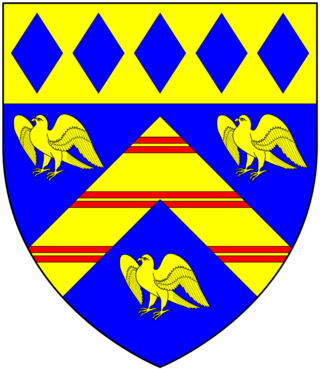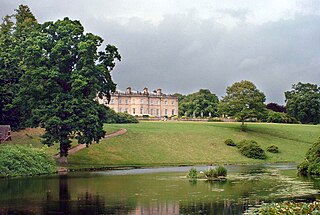
Marquess of Headfort is a title in the Peerage of Ireland. It was created in 1800 for Thomas Taylour, 2nd Earl of Bective.

Earl of Cottenham, of Cottenham in the County of Cambridge, is a title in the Peerage of the United Kingdom. It was created in 1850 for the prominent lawyer and Whig politician Charles Pepys, 1st Baron Cottenham. ) He served as Lord Chancellor from 1836 to 1841 and from 1846 to 1850. Pepys had already been created Baron Cottenham, of Cottenham in the County of Cambridge, in 1836, and was made Viscount Crowhurst, of Crowhurst in the County of Surrey, at the same time he was given the earldom. These titles are also in the Peerage of the United Kingdom. The viscountcy is used as a courtesy title for the Earl's eldest son and heir apparent.

Baron Roborough, of Maristow in the County of Devon, is a title in the Peerage of the United Kingdom. It was created on 24 January 1938 for Sir Henry Lopes, 4th Baronet. He had earlier represented Grantham, Lincolnshire, in Parliament as a Conservative. The Baronetcy, of Maristow House in the County of Devon, had been created in the Baronetage of the United Kingdom on 1 November 1805 for Manasseh Masseh Lopes, a member of a wealthy family of Portuguese Jewish origin, with special remainder to his nephew Ralph Franco, son of his sister Maria. Manasseh Masseh Lopes converted to Christianity in 1802, and later represented Evesham, in Worcestershire, Barnstaple in Devon, and Westbury in Somerset, in Parliament. However, in 1819 he was twice convicted of bribing the voters in both Barnstaple and Grampound in order to be elected to Parliament, and was sentenced to imprisonment and heavy fines. He was also unseated by the House of Commons, but after his release from prison he nonetheless got elected for Westbury, a pocket borough which he controlled to a great extent.
The Royden Baronetcy, of Frankby Hall in the County Palatine of Chester, is a title in the Baronetage of the United Kingdom. It was created on 29 July 1905 for Thomas Royden, head of Thomas Royden & Sons, shipowners. He also served as Lord Mayor of Liverpool and represented Toxteth West in the House of Commons as a Conservative. His eldest son, the second Baronet, was Chairman of the Cunard Line and sat as Member of Parliament for Bootle. On 28 January 1944 he was created Baron Royden, of Frankby in the County Palatine of Chester, in the Peerage of the United Kingdom. However, the peerage became extinct on his death in 1950 while he was succeeded in the baronetcy by his younger brother, the third Baronet.

There have been two baronetcies created for persons with the surname Burnett, one in the Baronetage of Nova Scotia and one in the Baronetage of the United Kingdom. As of 2010 one creation is extant while one is dormant.
The Ashburnham Baronetcy, of Broomham in the County of Sussex, is a title in the Baronetage of England. It was created on 15 May 1661 for Denny Ashburnham, Member of Parliament for Hastings. He was the grandson of Adam Ashburnham, Member of Parliament for Winchelsea in 1592, who was the son of Laurence Ashburnham, and a descendant of Richard Ashburnham of Broomham, second son of Thomas Ashburnham, whose eldest son John was the ancestor of the Earls of Ashburnham. He was succeeded by his elder son, William, the second Baronet. He represented Hastings and Seaford in the House of Commons. He died childless in 1755 and was succeeded by his younger brother, Charles, the third Baronet. His son, William, the fourth Baronet, was Bishop of Chichester. On his death the title passed to his son, the fifth Baronet. He sat as Member of Parliament for Hastings.

The Anson baronetcy, of Birch Hall in the County Palatine of Lancaster, is a title in the Baronetage of the United Kingdom held by a branch of the Anson family.
There have been two baronetcies created for members of the Blackett family, both in the Baronetage of England. One creation is extant as of 2013. The Blackett family can be traced back to the Blacketts/Blakheveds of Woodcroft, County Durham, some of whom became highly successful in the lead and coal mining industries in Northumberland and County Durham.

Sir Edward Cust, 1st Baronet, KCH was a British soldier, politician and courtier.
The Broadhead, later Brinckman Baronetcy, of Burton or Monk Bretton in the County of York, is a title in the Baronetage of the United Kingdom. It was created on 30 September 1831 for Theodore Broadhead, Member of Parliament for Yarmouth. In 1842 he resumed by Royal Licence the old family surname of Brinckman in lieu of his patronymic. Brinckman was the son of Theodore Broadhead, who also represented Yarmouth in the House of Commons, son of Theodore Broadhead, High Sheriff of Surrey in 1786, who assumed the surname of Broadhead in lieu of Brinckman by Act of Parliament. The latter's grandfather Theodore, Baron Brinckman, had emigrated to Britain from Hanover. The first Baronet was succeeded by his eldest son, the second Baronet. He sat as Liberal Member of Parliament for Canterbury. His grandson, the fourth Baronet died childless in 1954 and was succeeded by his younger brother, the fifth Baronet. The latter was a colonel in the Grenadier Guards, Aide-de-Camp to the Governor of Victoria and to the Governor-General of Canada and Chief of Staff to the British Military Mission in Moscow during the Second World War.

There have been four baronetcies created for persons with the surname Miller, two in the Baronetage of England, one in the Baronetage of Great Britain and one in the Baronetage of the United Kingdom. Two of the creations are extant as of 2008.

The Loraine Baronetcy, of Kirk Harle in the County of Northumberland, was a title in the Baronetage of England. It was created on 26 September 1664 for Thomas Loraine, High Sheriff of Northumberland. The second Baronet was Member of Parliament for Northumberland. The third Baronet was High Sheriff of Northumberland in 1742, the fourth Baronet in 1774 and the fifth Baronet in 1814. The eleventh Baronet was a rear admiral in the Royal Navy. The twelfth baronet was a distinguished diplomat. The title became extinct on his death in 1961.

The Mostyn baronets are two lines of Welsh baronets holding baronetcies created in 1660 and 1670, both in the Baronetage of England. One creation is extant as of 2015. The two lines are related and both claim descent from Edwin of Tegeingl, an 11th-century lord of Tegeingl, a territory which approximates modern Flintshire.
Sir Thomas Bernard Birch, 2nd Baronet DL was a British baronet and Whig politician.

Sir Richard Bulkeley Williams-Bulkeley, 10th Baronet was an English Whig and Liberal Party politician who sat in the House of Commons variously between 1831 and 1868.
The High Sheriff of Roscommon was the British Crown's judicial representative in County Roscommon, Ireland from 1575 until 1922, when the office was abolished in the new Free State and replaced by the office of Roscommon County Sheriff. The sheriff had judicial, electoral, ceremonial and administrative functions and executed High Court Writs. In 1908, an Order in Council made the Lord-Lieutenant the Sovereign's prime representative in a county and reduced the High Sheriff's precedence. However the sheriff retained his responsibilities for the preservation of law and order in the county. The usual procedure for appointing the sheriff from 1660 onwards was that three persons were nominated at the beginning of each year from the county and the Lord Lieutenant then appointed his choice as High Sheriff for the remainder of the year. Often the other nominees were appointed as under-sheriffs. Sometimes a sheriff did not fulfil his entire term through death or other event and another sheriff was then appointed for the remainder of the year. The dates given hereunder are the dates of appointment. All addresses are in County Roscommon unless stated otherwise.

There have been two Baronetcies created for persons with the surname Mitchell, one in the Baronetage of Great Britain and one in the Baronetage of the United Kingdom.
Sir David Wedderburn, 1st Baronet was a Scottish businessman and Tory politician. He was Postmaster General for Scotland 1823-31 and a member of two London militias before that.
Sir John Ramsden, 4th Baronet was an English landowner and Member of Parliament.
Sir Joseph Birch, 1st Baronet (1755–1833), of The Hazles, Prescot, near Liverpool, England, was the Member of Parliament for Nottingham from 1802 to 16 March 1803 and in 1818–1830, and for Ludgershall on 22 December 1812 – 1818. He was created baronet in 1831.











